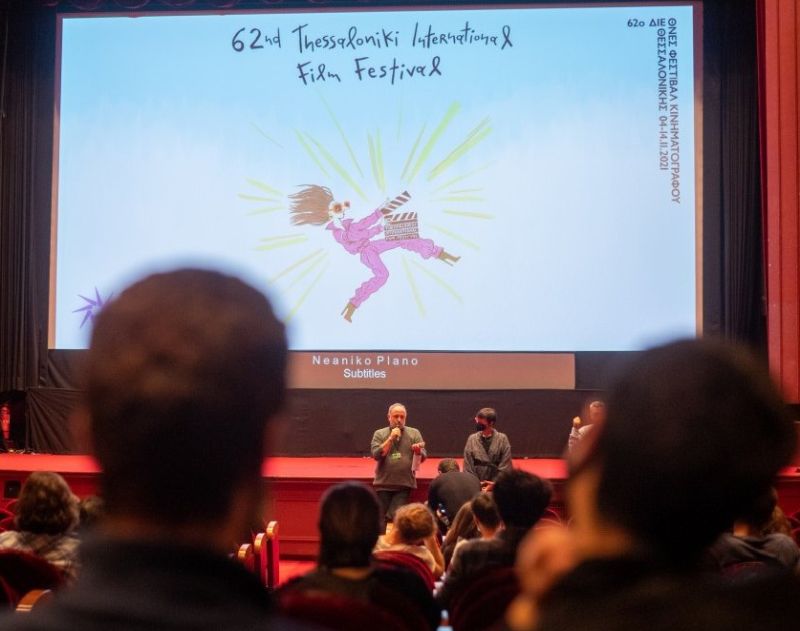62nd THESSALONIKI INTERNATIONAL FILM FESTIVAL
4-14/11/2021
Accessible screening of What did you do in the War Thanassi? by Dinos Katsourides
On Saturday November 5th, the screening of Dinos Katsourides’ film What did you do in the war, Thanassi? took place, wrapping up the two universally accessible screenings, held by the 62nd Thessaloniki International Film Festival, in collaboration with Alpha Bank, the Festival's accessibility sponsor. Thessaloniki International Film Festival’s aim is once again to share this power of cinema with all viewers. This is the reason why films with audio description [AD: Audio Description] for the blind and visually impaired and with subtitles for the Deaf and hard of hearing [SDH: Subtitles for the Deaf or hard of Hearing], are screened in both theatres and online screenings.
Christos Mitsis, film reviewer of Athinorama magazine prefaced the film, thanking the audience for its presence and congratulating the Festival people both for the action of the universally accessible screenings and for the realization of this event on the occasion of the tenth anniversary of Dinos Katsourides’ death.
"The film we are going to watch is shot in 1971. One of the most memorable moments in the history of Thessaloniki International Film Festival occurred in 1971, when Thanassis Veggos received one of the warmest applause in the history of the institution, as he stepped on stage to receive the Best actor award, in the Society of Macedonian Studies, where the Festival was held at the time. However let me go back to 1966, another historic year for the Thessaloniki Film Festival, when Dinos Katsourides was present again in Thessaloniki, with the film Short Break. The year is considered pivotal for Greek cinema, because six-seven that were released then are still among the best in the history of Greek cinema (Until the Ship Sails by Alexis Damianos, The Excursion by Takis Kanellopoulos, Face to Face of Roviros Manthoulis, Shine in the eyes of Panos Glykofrydis, The Death of Alexander by Dimitris Kollatos). The members of the jury were Manos Hadjidakis, Tsarouchis, Bakogiannopoulos, Grigoris Gregoriou, director, Elli Lambeti, Giorgos Vafopoulos, the famous poet from Thessaloniki. The jury ended up giving the award to the film Forgotten Heroes by Nikos Gardelis, produced by James Paris, a patriotic-heroic film of low quality, one of the many of that kind produced at the time. Taking into account of all these quality film screened in Thessaloniki, one would foresee a different future for Greek cinema, where commercial and artistic cinema would interact; unfortunately this was never the case. The Junta stopped every attempt for a more artistic approach. A little later, New Greek Cinema was born and the films mentioned above – or at least some of them – were considered the harbingers of what was to come", Mr. Mitsis said in his initial statement.
After the brief flashback, Mr. Mitsis delved into Dinos Katsourides' invaluable contribution to Greek cinema. "So, if there is one person, who shows us what could have happened if these two currents had interacted, it would be no other than Dinos Katsourides. Many of the films, films that we never watched, would combine artistic lures and commercial appeal to the audience; films like What did you do in the war, Thanassi?. Katsouridis, therefore, is an iconic figure of Greek cinema because he came from the old days but was constantly amazed at the sight of anything new. Tasos Graphos, one of the most prominent set designers, has written very aptly, that Katsourides was not just a great filmmaker; he was the cinema itself from A to Z. He was a great cinematographer and editor, he even quarrelled with Finos about the way because he could clearly see what the new way of expression. He is the man who has directed the three most hilariously melancholic comedies of Greek cinema, the films World Gone Mad, What did you do in the war, Thanassi? and Thanassis Take Your Gun. Funny films and at the same time so deeply melancholic, in a really hard-to-find combination", he said.
Finally, Mr. Mitsis made special reference to the fact that Dinos Katsourides used to help all young directors by lending his equipment or by working in short films for free as a director of photography. In a world where commercial and arthouse cinema are in opposite corners, Katsouridis stood in the middle, as he was familiar with both sides. We owe him a lot", Mr. Mitsis, concluded and invited the audience to watch the screening of the documentary A Life like a Cinema - Dinos Katsourides by Isavella Mavraki, companion of the tireless worker of Greek cinema. What did you do in the war Thanassis? and Isavella Mavraki's documentary make up a mini tribute to Dinos Katsourides by the 62nd Thessaloniki Film Festival, on the occasion of the tenth anniversary of his death.
A few words about the film What did you do in the war, Thanasis? (1971
Using the always subversive discourse of comedy, with Thanassis Vengos embodying everyday folk wisdom, submission and resistance at the same time, Dinos Katsourides focuses on the everyday man during the Occupation; the man who wishes not to get in trouble, but can’t held to get involved and drawn into the vortex of collective action. A simple worker, hungry, imprisoned, tortured, finds himself inadvertently resisting. The film also functioned as an underground parable about the junta regime and was one of the last major box office hits of Greek cinema at the time.
Globally accessible views
Sponsored by Alpha Bank, the Festival will hold two universally accessible screenings, where the public will have the opportunity to enjoy the masterpiece What did you do in the War Thanassi? by Dinos Katsourides, which changed the course of Thanassis Vengos' career, as well as the unforgettable Doxobus by Fotos Lambrinos, which takes us to the heart of Byzantine society in the 14th century. These films will be accessible both in the festival halls and in their online screenings.
Accessibility sponsor:
In collaboration with:















